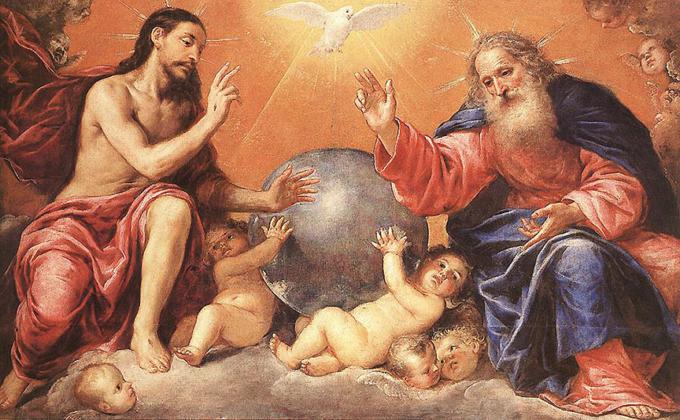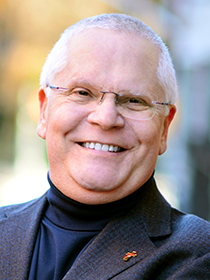
Culture
Even more than a wedding, a baptism is a sign of a new beginning -- and a future that stretches before us without limits. Anything seems possible.

Kandra
Dt 4:32-34, 39-40
Ps 33:4-5, 6, 9, 18-19, 20, 22
Rom 8:14-17
Mt 28:16-20
Periodically, people ask me, "What is your favorite part of being a deacon?" Near the top of my list would have to be the opportunity to celebrate the sacrament of baptism. There's just nothing like it.
There is a small green book that priests and deacons use for the Rite of Baptism. It has everything spelled out in there, all the readings and prayers. On the last page of my own copy of the book, I have scrawled a name and a date: "Margaret Flanagan, July 1, 2007." That was the first baby I ever baptized. Little Margaret, I should add, was very well behaved. She didn't cry. (For the record, I was bawling. I couldn't believe what I was doing. But Margaret, God bless her, was cool, calm, and collected.)
Baptisms are typically joyous occasions. It's a day of tremendous possibility and hope. Even more than a wedding, a baptism is a sign of a new beginning -- and a future that stretches before us without limits. Anything seems possible.
We could almost say the same about this solemnity we celebrate this Sunday, honoring the Most Holy Trinity. We are reminded anew that our God shatters our human limitations and dwells with us in three persons -- an infinite mystery that has defied easy explanation for centuries.
But the Gospel this Sunday -- with Christ's instructions to his apostles about baptism -- also reminds us of something vital and significant. It tells us that the very notion of the Trinity lies at the center of our faith. It's part of us from day one.
From the very start of our lives as Christians, when we feel that first splash of water, we are claimed in the name of the Father and the Son and the Holy Spirit. It underscores the extraordinary importance the church places on this singular belief, this one great dogma: one God, in three persons.
It all begins with the Trinity.
That is one of the reasons we celebrate this feast, one week after Pentecost. Following the Holy Spirit's thunderous arrival in the Upper Room, the Trinity has been revealed to a waiting world, Father, Son and Spirit, and we pause to rejoice in this extraordinary gift.
It's a gift that most believers will tell you can be overwhelming and hard to grasp. Saints and theologians have attempted to explain it for centuries -- St. Patrick memorably used the three-leafed shamrock to illustrate the notion of one God in three persons -- but preachers today will tell you it is a minefield; one wrong step can explode into misinformation or outright heresy. (I remember a priest once telling me that he tries to schedule his vacation for the time around Trinity Sunday. "I always try to take off that week," he confided, "because I don't want to have to preach that day.")
But this much needs to be preached, and often: the Trinity is more than an abstract concept. It is a reality that touches our lives in innumerable ways -- beginning with our creation at the hands of God, our salvation through his Son Jesus Christ, and our ongoing conversion as people of inspiration, resilience, and hope through the Holy Spirit.
And don't forget how it is imparted to us in baptism -- a sacred moment that is reenacted again and again every time we dip our fingers into a font and bless ourselves in the name of that very Trinity.
When I baptized little Margaret Flanagan, I gave her parents a lit candle and said the same words that have spoken to countless Christians across the ages: "Receive the light of Christ."
Thinking about that moment, I'm reminded of something the Methodist preacher John Wesley once said about the Trinity. With a nod to St. Patrick, he attempted to explain it this way: it's like a candelabra with three candles, he said, but giving off one light.
In whatever ways we may try to understand the mystery and meaning of the Trinity, perhaps that's one image all of us can all understand. Ultimately, by virtue of our baptism, we are called to live in that light -- to always draw closer to it, and to always strive to give it to others.
May we always pray to do that in the name of the one God in three persons -- in the name of the Father, and the Son and the Holy Spirit.
- Deacon Greg Kandra is an award-winning author and journalist, and creator of the blog, "The Deacon's Bench."
Recent articles in the Culture & Events section
-
Tolkien's world, still popular on the big screen, began with faith and wordsCecilia Hadley
-
Scripture Reflection for Dec. 22, 2024, Fourth Sunday of AdventDeacon Greg Kandra
-
Getting adult children to Christmas MassGreg Erlandson
-
The work of redemptionEileen McLaughlin
-
Intern reflectionsEmily Greco and James Kaeser


















